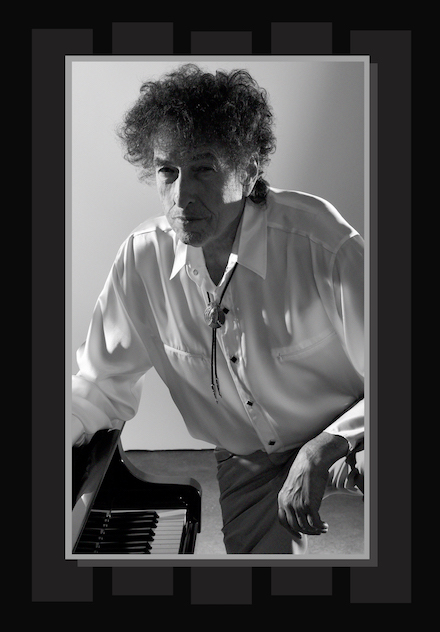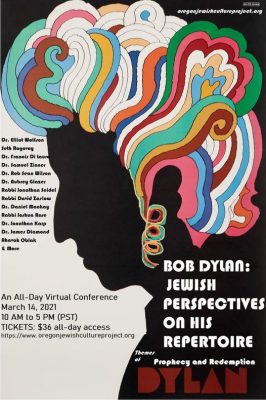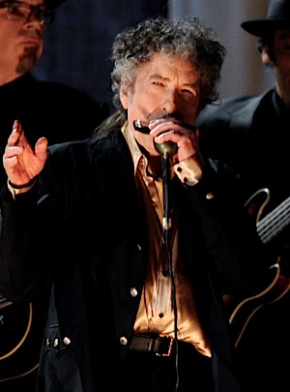by Seth Rogovoy
Among Bob Dylan’s many talents besides his widely-acclaimed, Nobel Prize-winning songwriting is doing interviews and, back in the 1960s when artists did them as a matter of course, holding press conferences. Dylan has always used the interview format as a means of personal expression in no less a creative and formalistic way than he does in his songwriting, poetry, books, painting, sculpture, acting, and filmmaking.

Bob Dylan
And in his newest Q&A, featured on the official Bob Dylan website, Dylan shows no signs of letting up. It’s a masterpiece of style, brilliance, humor, and phrasemaking. Slightly less arch than previous interviews – you really get the feeling Dylan is a lot less evasive than usual, a lot less tactical in his artful use of the dodge or the tall tale – Dylan comes across as remarkably present, thoughtful, and aware, and also as mischievous as ever.
Here are some of my favorite quotes from the interview with his interlocutor, Bill Flanagan (BF), some just left to resonate on their own, others with my brief rejoinders. Much of the interview focuses on Dylan’s new triple-album of pre-rock pop standards, and more generally, his attachment to those songs and that era of popular music. All of Dylan’s quotes are in italics, and the full interview and context is available in the original interview at BobDylan.com:
On the pre-rock pop standards he records and performs:
There’s enough of my personality written into the lyrics so that I could just focus on the melodies within the arrangements.
I had some idea of where they stood, but I hadn’t realized how much of the essence of life is in them – the human condition, how perfectly the lyrics and melodies are intertwined, how relevant to everyday life they are, how non-materialistic.
I can’t help but note here that the opposite of materialistic is spiritual. When Dylan says “non-materialistic,” I think that’s what he means. — SR
These songs are some of the most heartbreaking stuff ever put on record and I wanted to do them justice. Now that I have lived them and lived through them I understand them better.
Modern music and songs are so institutionalized that you don’t realize it.
These songs are cold and clear-sighted, there is a direct realism in them, faith in ordinary life just like in early rock and roll.
—————————
About postwar life growing up in Duluth:
My mom says there were food shortages…
I find it sweet that he still talks about his mother, Beatrice “Beatty” Stone Zimmerman, who died in 2000, in the present tense. — SR
——————————-
On seeing old footage of himself performing in the Sixties:
I see … a very strange enchanted boy, a terribly sophisticated performer, got a cross section of music in him, already postmodern. That’s a different person than who I am now.
——————————–
On his singing:
My voice cracking here and there wouldn’t bother me, bum notes or wrong chords would bother me more.
This is so true and people have never understood this about his singing. Bob Dylan NEVER hits a wrong note. It’s his tone and phrasing that are so unique, that make him sound like Bob Dylan and no one else, and perhaps the vocal quality that some find to be – to their great loss – off-putting. – SR
—————————–
Dylan recalls a private exchange with Frank Sinatra:
“You and me, pal, we got blue eyes, we’re from up there,” and he [Sinatra] pointed to the stars. “These other bums are from down here.” I remember thinking that he might be right.
——————————
Songwriters have to have a reason to write songs, there has to be some purpose to performing it too. And sometimes it doesn’t connect. There is no magic formula to make that happen.
——————————
Rock and roll was high energy, explosive and cut down. It was skeleton music, came out of the darkness and rode in on the atom bomb and the artists were star headed like mystical Gods.
Such a perfectly beautiful and magical description of rock and roll. Dylan goes on at length about this, returning twice more to the connection between the atomic bomb and rock and roll. A concept worth some extra thought. — SR
———————————
You start out wondering why you bought those blue pajamas and later you’re wondering why you were born.
A classic Dylan Zen koan. — SR
———————————-
…. the melody in this song is kind of like the background in the Mona Lisa painting, a mystical, phantasmagorical fantasy land.
Add art critic to Dylan’s c.v. — SR
———————————–
On the passage of time:
Entire industries go, lifestyles change, corporations kill towns, new laws replace old ones, group interests triumph over individual ones, poor people themselves have become a commodity.
Dylan as prophet. — SR
————————————–
BF: “Is there a real woman you picture when you sing some of these? More than one?”
Dylan: Real? Of course they’re real. I hope so.
—————————————
On the creative process:
Once you get the idea, everything you see, read, taste or smell becomes an allusion to it. It’s the art of transforming things. You don’t really serve art, art serves you and it’s only an expression of life anyway; it’s not real life. It’s tricky, you have to have the right touch and integrity or you could end up with something stupid.
————————————–
Did you say Taylor Swift?
————————————-
On hunting as a boy:
I went into the woods with my uncle, my mother’s brother – he was an expert hunter and tried to teach me. But it wasn’t for me, I hated it.
————————————-
Is he, as is often suggested, the “jester” in Don McLean’s song “American Pie”?
Don McLean, “American Pie,” what a song that is. A jester? Sure, the jester writes songs like “Masters of War,” “A Hard Rain’s a-Gonna Fall,” “It’s Alright, Ma” – some jester. I have to think he’s talking about somebody else. Ask him.
————————————–
On his discussion of Tom Wilson, the official record company executive credited as producer of his album “Bringing It All Back Home” and the track “Like a Rolling Stone” on the follow-up album, “Highway 61 Revisited”: Dylan’s comments about Wilson are quite revealing, in that while he’s somewhat complimentary, he’s also very diplomatic and not especially effusive in praise. I think you can hear loud and clear on “The Cutting Edge” sessions that the two of them merely tolerated each other (although they do occasionally enjoy a hearty laugh together). I think Dylan much more enjoyed working with his next producer, Bob Johnston, and you can also hear that on “The Cutting Edge.” – SR
——————————————
On Amy Winehouse:
I liked Amy Winehouse’s last record…. She was the last real individualist around.
—————————————–
Heard any good records lately?
Iggy Pop’s Après, that’s a good record. Imelda May, I like her. Valerie June….
See what he does there? Always the joker. — SR
——————————————-
BF: “When you’re on your bus, what shows do you watch on TV?”
BD: I Love Lucy, all the time, non-stop.
——————————————
BF: Why do fences come up between different styles of American music?
BD: Because of the pressure to conform.
 (EUGENE, Ore.) – Seth Rogovoy will deliver a multimedia program for BOB DYLAN: JEWISH PERSPECTIVES ON HIS REPERTOIRE: Themes of Prophecy and Redemption, a virtual symposium bringing together a wide spectrum of Dylan scholars, academics, students, musicians and fans to discuss Bob Dylan’s repertoire through a Jewish lens, on Sunday, March 14, 2021, noon-8pm (Eastern Time).
(EUGENE, Ore.) – Seth Rogovoy will deliver a multimedia program for BOB DYLAN: JEWISH PERSPECTIVES ON HIS REPERTOIRE: Themes of Prophecy and Redemption, a virtual symposium bringing together a wide spectrum of Dylan scholars, academics, students, musicians and fans to discuss Bob Dylan’s repertoire through a Jewish lens, on Sunday, March 14, 2021, noon-8pm (Eastern Time).


 by Seth Rogovoy
by Seth Rogovoy






